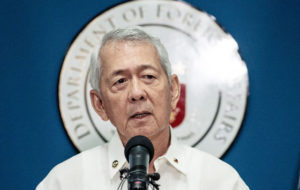Foreign Affairs Secretary Perfecto Yasay called on “all those concerned to exercise restraint and sobriety” and said the decision upheld international law, particularly the 1982 UN Convention on the Law of the Sea (Unclos).
Supreme Court Associate Justice Francis Jardeleza, who was part of the Philippine legal team that went to The Hague, said the ruling is final and cannot be appealed, and should pave the way for a diplomatic solution to the long-standing dispute that involves multiple claimants.
But Beijing, which refused to participate in the arbitration said the award “is null and void and has no binding force.”
Beijing “does not accept any means of third party dispute settlement or any solution imposed on China,” it added, reiterating its long-standing position on the dispute.
‘No legal basis’
The tribunal junked China’s position that it has historic rights to the waters within the U-shaped nine-dash line, and maintained that Filipino fishermen enjoy fishing rights at Panatag Shoal (Scarborough Shoal), which had been restricted by the Chinese Navy.
Panganiban (Mischief) Reef, Ayungin (Second Thomas) Shoal and Recto (Reed) Bank “form part of the exclusive economic zone and continental shelf of the Philippines, and are not overlapped by any possible entitlement of China,” it said in a statement.
China’s historic rights, according to the tribunal, were “extinguished to the extent they were incompatible with the exclusive economic zones provided” under Unclos.
There was also “no evidence China had historically exercised exclusive control over the waters or their resources,” it said.
Moreover, China “inflicted irreparable harm to the marine environment, built a large artificial island in the Philippines’ exclusive economic zone and destroyed evidence of the natural condition of features in the South China Sea that formed part of the Parties’ dispute.”
China embarked on “large-scale land reclamation and construction of artificial islands at seven features in the Spratly Islands,” causing “severe harm to the coral reef environment.”
Chinese authorities were in fact “aware that Chinese fishermen have harvested endangered sea turtles, coral and giant clams on a substantial scale in the South China Sea.”
The tribunal also ruled that the Spratlys, collectively or as a unit, do not generate extended maritime areas or EEZs for China, even with land reclamation and construction as well as the presence of official personnel.
“Having found that none of the features claimed by China was capable of generating an exclusive economic zone, the tribunal found that it could — without delimiting a boundary — declare that certain sea areas are within the exclusive economic zone of the Philippines, because those areas are not overlapped by any possible entitlement of China,” it explained.
The arbitration panel was composed of Presiding Arbitrator Thomas Mensah of Ghana, Jean-Pierre Cot of France, Stanislaw Pawlak of Poland, Alfred Soons of the Netherlands and Rüdiger Wolfrum of Germany.
Warning issued
The Philippine Embassy in China has warned its citizens to beware of personal “threats” and avoid political debates.
Nationalist demonstrations are not rare in China, sometimes apparently with the tacit backing of authorities.
More than 20 Chinese police were positioned outside the embassy, with more in vans nearby--a significantly larger presence than usual--along with two lorries loaded with crowd control barriers, a possible indication that authorities expected protests.
Ahead of the decision, President Rodrigo Duterte had signaled he did not want to antagonize China, saying he would not “taunt or flaunt” a favorable ruling and would seek a “soft landing” with China.
But Chinese President Xi Jinping said earlier this month that Beijing would never compromise on sovereignty, adding, “We are not afraid of trouble.”
With AFP, MICHAEL JOE T. DELIZO and Jomar Canlas


